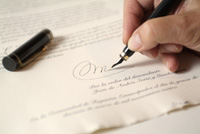
By: Nicole Nelson
The number one mistake of estate planning is the mistake of “never getting around to it”. If an estate is not made, including designation of a trustee, a will and a living will the people who are closest to you may be left with your debt or have to make tough decisions because you “never got around” to drafting documents that explain what you would like to happen to you and your assets. By creating an estate you are letting your beneficiaries know what you would like to be done in some touchy situations. This also may prevent arguments between beneficiaries because your wishes were clearly laid out.
Another mistake that is commonly made is the myth that estate planning is only important for the wealthy. Regardless of the size of your net worth, everyone owns assets that are worth something. Also, some people end up surprised how large their estates actually are after taking into account things like the value of their home. If you are concerned what so ever with where your assets will end up upon your demise, an estate needs to be seriously considered.
Although a will is made, does not mean the job is done. This is another mistake that has caused people legal trouble in the past. Things such as birth or adoption of children, divorce, death and other factors may change how your will is divided to your beneficiaries. Other things such as the sale or purchase of large and valuable assets or just simply changes in tax legislation may make your will not as legally tangible as you thought. This is where review and updates of your will are important.
http://www.allbusiness.com/personal-finance/retirement-estate-planning/4005-1.html
http://www.investopedia.com/articles/retirement/08/estate-planning-mistakes.asp?viewed=1
http://www.lawguru.com/articles/law/trusts-wills-and-probate/the-most-frequent-estate-planning-mistakes






